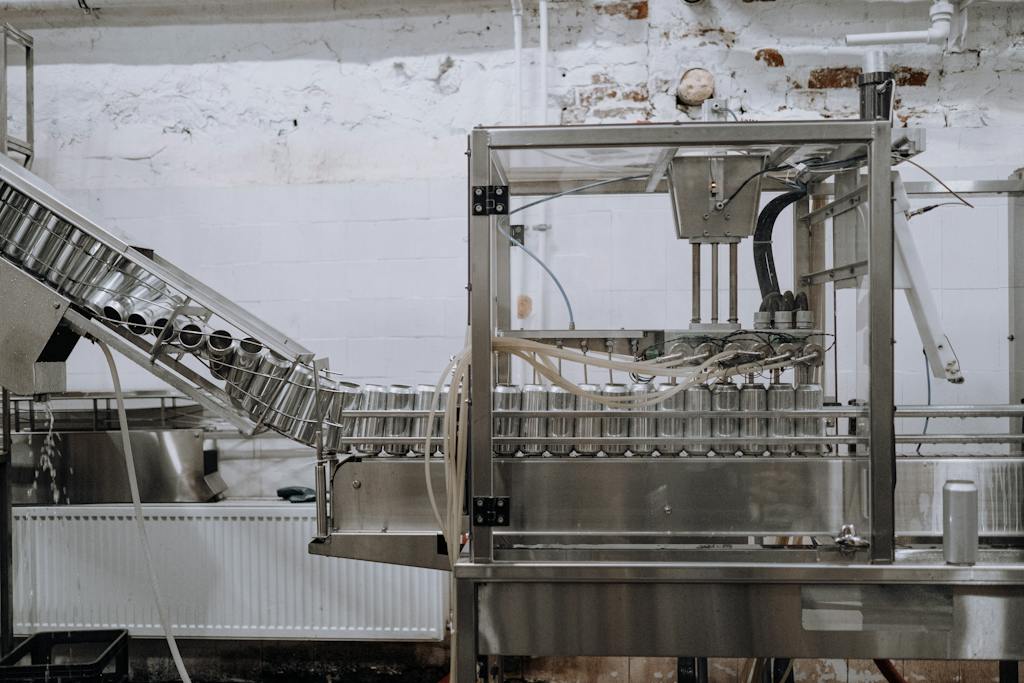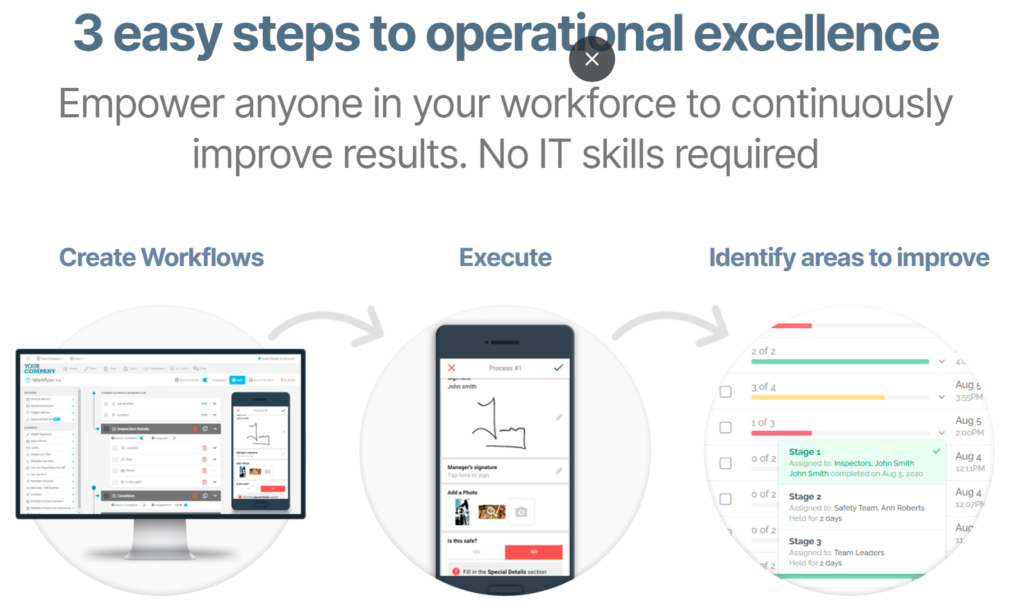Modern manufacturing is confronted with many obstacles. These challenges range from supply chain disruptions to cybersecurity concerns, posing significant hurdles for manufacturers. Embracing digital workflow solutions is imperative amidst these complexities. Furthermore, implementing lean
manufacturing principles is crucial for optimizing operations and resource utilization. Let’s delve into the challenges facing manufacturing, and explore how FAT FINGER, a digital workflow builder, can help you overcome these challenges. Learn more about FAT FINGER.
Digital Transformation in Manufacturing

The digitization of manufacturing, often called Industry 4.0, has revolutionized the production landscape, offering innovative solutions to age-old challenges. This transformation encompasses a variety of technological advancements and strategic measures aimed at enhancing operational efficiency and competitiveness.
Adoption of Industry 4.0 Technologies
Industry 4.0 in production entails integrating technologies such as Internet of Things (IoT) and Artificial Intelligence (AI) to optimize manufacturing processes. Manufacturers can achieve process optimization, predictive maintenance, and real-time monitoring by harnessing IoT and AI, leading to improved productivity and cost savings.
FAT FINGER aids in this integration, offering solutions that optimize manufacturing processes and enhance connectivity and cybersecurity measures. Learn how FAT FINGER supports IoT and AR integration.
Enhanced Connectivity and Cybersecurity Measures
As manufacturing becomes increasingly connected through digital networks, ensuring robust cybersecurity measures is paramount. Implementing secure communication protocols and advanced encryption techniques helps to safeguard sensitive data and intellectual property from cyber threats.
Industry Expert: “The adoption of Industry 4.0 technologies signifies a pivotal shift towards smarter, more efficient manufacturing processes.”
Global Market Competition
In modern manufacturing, global market competition presents a formidable challenge. The dynamic landscape of international market rivalry brings forth many marketplace challenges, including the impact of trade tariffs and geopolitical instabilities.
Navigating Trade Tariffs and Geopolitical Instabilities
Manufacturers are compelled to navigate through the complexities of competition in global trade, which often involves mitigating the impacts of trade tariffs.
One strategic approach involves diversifying the supply chain to minimize the adverse effects of tariffs on raw materials and components. Additionally, adaptation to changing global trade policies is essential for maintaining competitiveness in the face of geopolitical instabilities.
Market Expansion Strategies
To address the challenges posed by global market competition, manufacturers are exploring new emerging markets as part of their market expansion strategies.

This involves identifying opportunities in previously untapped regions and developing localized marketing approaches tailored to the distinct preferences and needs of diverse consumer bases.
These strategic initiatives are pivotal for manufacturers seeking to thrive amidst the intense competition in today’s global marketplace.
Lean Manufacturing Implementation

Lean manufacturing focuses on efficient production methods and streamlined practices. FAT FINGER supports this by enabling the creation of digital workflows and checklists that align with lean principles, enhancing operational efficiency. See how FAT FINGER facilitates lean manufacturing.
Waste Reduction and Process Optimization
In lean manufacturing implementation, the focus is on efficient production methods and streamlined manufacturing practices. This involves adopting lean principles to minimize waste and optimize processes to enhance operational efficiency.
Manufacturers are embracing continuous improvement methodologies to achieve waste reduction and process optimization. Systematically identifying inefficiencies and implementing targeted solutions can streamline production processes, reduce lead times, and minimize resource wastage. This proactive approach contributes to cost savings and enhances the quality of manufactured goods.
Take process improvement to the next level with FAT FINGER.
Employee Involvement and Empowerment
A key aspect of lean production strategies is creating a culture of employee involvement in process improvement. Manufacturers empower frontline workers by encouraging their active participation in identifying areas for improvement and implementing innovative solutions. This collaborative approach fosters a sense of ownership among employees, leading to increased engagement and a more efficient decision-making process at all levels of the organization.
Empowering frontline workers for decision-making leads to improved operational outcomes and creates a work environment that values creativity, innovation, and continuous learning. As a result, manufacturers can leverage the collective expertise of their workforce to drive sustainable improvements across all facets of the production process.
Automation and Quality Control
In modern manufacturing, automation and quality control are pivotal aspects that significantly impact operational efficiency and product quality. Integrating robotics and automated systems, along with adopting advanced quality management techniques, plays a crucial role in streamlining production processes and ensuring high quality standards.
Integration of Robotics and Automated Systems
- Manufacturers increasingly leverage robotic automation to handle repetitive tasks within the production environment. This includes material handling, assembly operations, and packaging processes, where robots can operate with precision and consistency, leading to enhanced productivity.
- Furthermore, implementing automated inspection systems for quality assurance has become a cornerstone of modern manufacturing practices. Automated inspection technologies utilize advanced sensors and imaging systems to detect defects, measure product dimensions, and ensure compliance with stringent quality standards. This reduces the risk of human error and enables real-time monitoring of production outputs.
Adoption of Advanced Quality Management Techniques
- Manufacturers use statistical process control methods in automated production and quality assurance to monitor and maintain consistent product quality. By analyzing production data in real time, deviations from desired quality parameters can be promptly identified and rectified, ensuring that products meet predefined specifications.

- Additionally, adopting Six Sigma methodologies for process improvement has gained prominence in modern manufacturing environments. This data-driven approach focuses on minimizing variations in production processes to achieve higher levels of precision and reliability. By implementing Six Sigma principles, manufacturers can optimize their operations while continuously striving for excellence in product quality.
Integrating robotics and automated systems alongside advanced quality management techniques underscores a commitment to achieving operational excellence while meeting stringent quality benchmarks.
FAT FINGER’s Role in Addressing Manufacturing Challenges
FAT FINGER emerges as a pivotal digital solution in transforming manufacturing processes, driving efficiency, and ensuring compliance.

Create and deploy Digital Workflows
FAT FINGER’s intuitive interface allows manufacturers to easily create and deploy digital workflows, replacing outdated paper-based systems. This transition not only streamlines operations but also significantly reduces the margin of error, enhancing overall productivity. By digitizing processes, FAT FINGER provides real-time visibility into operations, enabling manufacturers to make informed decisions quickly. Discover FAT FINGER’s digital workflows.
Quality Control
A key challenge in manufacturing is maintaining consistent quality control. FAT FINGER addresses this by enabling the implementation of standardized procedures and checklists. These tools ensure that every step of the manufacturing process adheres to the highest quality standards, thereby reducing defects and increasing customer satisfaction. Learn how FAT FINGER improves quality control.
Safety
Safety is another critical concern in manufacturing. FAT FINGER enhances safety protocols by allowing for the quick creation and dissemination of safety procedures and compliance checklists. This proactive approach to safety management not only protects employees but also mitigates the risk of costly accidents and non-compliance penalties. Explore FAT FINGER’s safety solutions.
Analytics
Moreover, FAT FINGER’s analytics capabilities provide valuable insights into manufacturing operations. By analyzing data collected through the platform, manufacturers can identify areas for improvement, optimize resource allocation, and predict maintenance needs, leading to reduced downtime and increased efficiency. See how FAT FINGER’s analytics drive improvements.


